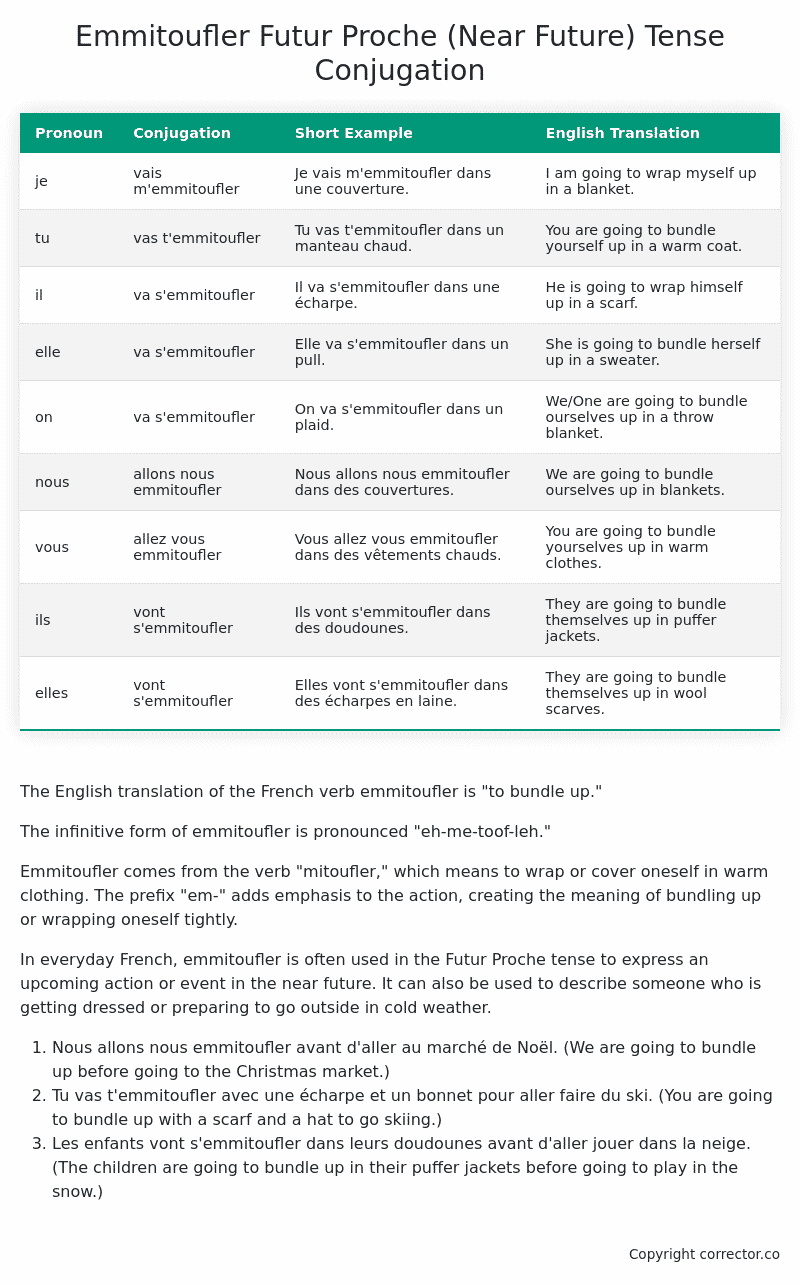Futur Proche (Near Future) Tense Conjugation of the French Verb emmitoufler
Introduction to the verb emmitoufler
The English translation of the French verb emmitoufler is “to bundle up.”
The infinitive form of emmitoufler is pronounced “eh-me-toof-leh.”
Emmitoufler comes from the verb “mitoufler,” which means to wrap or cover oneself in warm clothing. The prefix “em-” adds emphasis to the action, creating the meaning of bundling up or wrapping oneself tightly.
In everyday French, emmitoufler is often used in the Futur Proche tense to express an upcoming action or event in the near future. It can also be used to describe someone who is getting dressed or preparing to go outside in cold weather.
- Nous allons nous emmitoufler avant d’aller au marché de Noël. (We are going to bundle up before going to the Christmas market.)
- Tu vas t’emmitoufler avec une écharpe et un bonnet pour aller faire du ski. (You are going to bundle up with a scarf and a hat to go skiing.)
- Les enfants vont s’emmitoufler dans leurs doudounes avant d’aller jouer dans la neige. (The children are going to bundle up in their puffer jackets before going to play in the snow.)
Table of the Futur Proche (Near Future) Tense Conjugation of emmitoufler
| Pronoun | Conjugation | Short Example | English Translation |
|---|---|---|---|
| je | vais m’emmitoufler | Je vais m’emmitoufler dans une couverture. | I am going to wrap myself up in a blanket. |
| tu | vas t’emmitoufler | Tu vas t’emmitoufler dans un manteau chaud. | You are going to bundle yourself up in a warm coat. |
| il | va s’emmitoufler | Il va s’emmitoufler dans une écharpe. | He is going to wrap himself up in a scarf. |
| elle | va s’emmitoufler | Elle va s’emmitoufler dans un pull. | She is going to bundle herself up in a sweater. |
| on | va s’emmitoufler | On va s’emmitoufler dans un plaid. | We/One are going to bundle ourselves up in a throw blanket. |
| nous | allons nous emmitoufler | Nous allons nous emmitoufler dans des couvertures. | We are going to bundle ourselves up in blankets. |
| vous | allez vous emmitoufler | Vous allez vous emmitoufler dans des vêtements chauds. | You are going to bundle yourselves up in warm clothes. |
| ils | vont s’emmitoufler | Ils vont s’emmitoufler dans des doudounes. | They are going to bundle themselves up in puffer jackets. |
| elles | vont s’emmitoufler | Elles vont s’emmitoufler dans des écharpes en laine. | They are going to bundle themselves up in wool scarves. |
Other Conjugations for Emmitoufler.
Le Present (Present Tense) Conjugation of the French Verb emmitoufler
Imparfait (Imperfect) Tense Conjugation of the French Verb emmitoufler
Passé Simple (Simple Past) Tense Conjugation of the French Verb emmitoufler
Passé Composé (Present Perfect) Tense Conjugation of the French Verb emmitoufler
Futur Simple (Simple Future) Tense Conjugation of the French Verb emmitoufler
Futur Proche (Near Future) Tense Conjugation of the French Verb emmitoufler (this article)
Plus-que-parfait (Pluperfect) Tense Conjugation of the French Verb emmitoufler
Passé Antérieur (Past Anterior) Tense Conjugation of the French Verb emmitoufler
Futur Antérieur (Future Anterior) Tense Conjugation of the French Verb emmitoufler
Subjonctif Présent (Subjunctive Present) Tense Conjugation of the French Verb emmitoufler
Subjonctif Passé (Subjunctive Past) Tense Conjugation of the French Verb emmitoufler
Subjonctif Imparfait (Subjunctive Imperfect) Tense Conjugation of the French Verb emmitoufler
Conditionnel Présent (Conditional Present) Tense Conjugation of the French Verb emmitoufler
Conditionnel Passé (Conditional Past) Tense Conjugation of the French Verb emmitoufler
L’impératif Présent (Imperative Present) Tense Conjugation of the French Verb emmitoufler
L’infinitif Présent (Infinitive Present) Tense Conjugation of the French Verb emmitoufler
Struggling with French verbs or the language in general? Why not use our free French Grammar Checker – no registration required!
Get a FREE Download Study Sheet of this Conjugation 🔥
Simply right click the image below, click “save image” and get your free reference for the emmitoufler Futur Proche tense conjugation!

Emmitoufler – About the French Futur Proche (Near Future) Tense
Formation
1. Conjugate “aller” in the present tense according to the subject pronoun:
2. Add the infinitive of the main verb immediately after “aller.” For example:
Common Everyday Usage
Interactions with Other Tenses
Present Tense
Past Tense
Conditional Tense
Summary
I hope you enjoyed this article on the verb emmitoufler. Still in a learning mood? Check out another TOTALLY random French verb conjugation!


